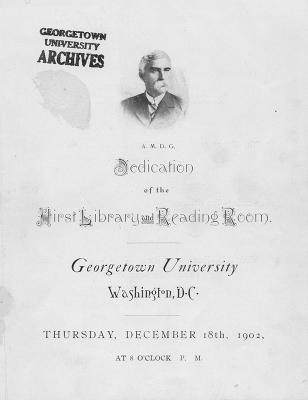The Bioethics Research Library is located in Georgetown's Healy Hall and is open to students, faculty, and visiting researchers. It occupies the space once known as the Hirst Library. The Bioethics Research Library first began as just a few shelves collected by the Kennedy Institute of Ethics, but now has the largest collection of books on bioethics and biomedical research, with more than 100,000 volumes.
Architecture
Located on the first floor at the south end of Healy Hall, the Bioethics Research Library began as the Hirst Library, named in honor of Anthony A. Hirst, an alumnus of the class of 1870, who donated money for the construction of the library. The Hirst Library was officially dedicated on December 18, 1902 and initially had around 5,000 books for undergraduate and graduate students. Brother Francis Schroen, the artist behind Gaston Hall, later decorated the library with frescoes on the history of writing, including Egyptian hieroglyphics, Runic writing, the Book of Kells, and the Douai Bible. These frescoes were of tromp l'oeil paintings of wood strips and panels of carved oak leaf and acorn. Brother Schroen, in his original design, bordered and bisected the room with plaster beams grained to look like oak. Brother Schroen described his designs for Gaston Hall, the Philodemic Room, Riggs Library, and Hirst Library as fitting for an institution of higher learning where the decorations not only serve an aesthetic purpose but also nurtures the mind of the observer.
In the original library there was a statue of St. Aloysius, which was a gift to the university by Mrs. O'Brien, whose son Frank O'Brien went to Georgetown and died on July 22, 1899 before he could graduate.
History
Georgetown's School of Foreign Service, initially located in 506 E Street, NW, with Georgetown's Law school, moved to the main campus in 1933, and occupied the classrooms and libraries of the first floor of Gaston Hall. The books that were originally in the School of Foreign Service's library were divided between the Hirst Reading Room and the Hirst Library of the College of Arts and Sciences.
In 1985, the library was awarded a grant by the National Library of Medicine of the National Institute of Health. The library was renamed as the Bioethics library in 2010, after the second floor of the Hirst library received funding from the Joseph P. Kennedy, Jr. Foundation to support research related to science and ethics. Not only is it a popular study spot among Georgetown students, the Bioethics Research Library boasts as one of the largest collection of books on the subject of Bioethics.1
- 1https://library.georgetown.edu/bioethics/about


